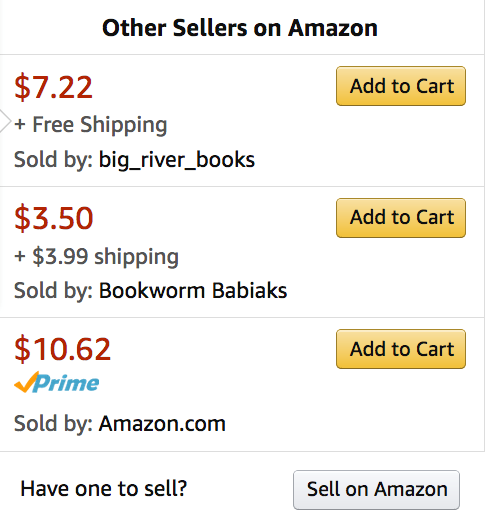PUBLISHED JUNE 2017
by Angela Bole, CEO, Independent Book Publishers Association -
 Angela Bole
Angela BoleLast month, IBPA published
an open letter about the March 1 Amazon policy change that makes it possible for third-party sellers to compete for the Buy Box for books. As this issue is ongoing, I wanted to take some time in this month’s Director’s Desk to update you on reactions and additional thoughts that circulated immediately after our open letter dropped.
In case you’re not visualizing the Buy Box in your mind, it looks like this:

When you go to a product page on Amazon, the “Add to Cart” Buy Box is the default option. Additional options fall below the Buy Box, a bit out of the way and not always known to consumers. Where books are concerned, the default Buy Box has always belonged to the publisher. When you buy a book, Amazon pays the publisher 45 percent of the list price. This means a consumer’s purchase is supporting the entity that published the book, namely the publisher, and authors are making a profit (albeit small) every time a consumer buys because the publisher is paying an author royalty for each sale.
Now Amazon is offering that priority spot to third-party sellers, relegating the publisher button to a far less favorable position, below the landing page screen line, often last in a list of third-party sellers offering the book for a significantly lower cost in addition to free shipping.
See the following example:

IBPA believes Amazon’s policy change, allowing third-party sellers to compete for the Buy Box for books in “new condition,” hurts authors and publishers. And it’s not just us. Here is how a May 10, 2017, article in the
New Republic entitled “
Amazon Steps Up Its Battle with the Book Industry” described the problem:
“To qualify, third-party sellers have to sell new books and meet certain criteria involving price, availability, and delivery time. The rub is that these third-party sellers have not always purchased books from publishers—they sometimes are selling remainders or advance copies. Publishers—including some very, very large ones like Penguin Random House—are now desperately figuring out the sources of these sellers’ books. They are worried that publishers and authors may not be paid from all sales.”
Where might these third-party sellers be getting the books they sell that don’t result in author compensation? Any number of ways, including donated books, closeout sales, sidewalk sellers, remainder and overstock dealers, “hurts” from distributor stock, stolen books, and promo copies and ARCs.
After
Publishers Weekly’s May 9, 2017, article, “
New Amazon Buy Button Program Draws Ire of Publishers, Authors,” we finally heard directly from an Amazon spokesperson on the issue. The spokesperson wrote to PW to insist that books obtained in one of the ways described above wouldn’t qualify because the books must be “new.” Here is how Amazon says they define new:
“What Amazon defines as new is found in its guidelines as: ‘brand-new, unused, unread copy in perfect condition. The dust cover and original protective wrapping, if any, is intact. All supplementary materials are included and all access codes for electronic material, if applicable, are valid and/or in working condition.’”
The problem is that Amazon does nothing to enforce the “new” policy. The entity that gets to declare that the book is “new,” by simply choosing the “new” option, one assumes, is the third-party seller. Anyone in the book industry for any length of time knows that other categories of books are rampant.
Karla Olson, director at Patagonia Books, said, “We received a comment on one of our books that it was riddled with typos, and the captions were all the same for the second half of the book. It took us a few reads to figure out that the customer had bought, as ‘new,’ an ARC, from Amazon. As you can imagine, the best quality is key here, and we take these comments very seriously. I ended up sending the guy a copy of the actual book, but he was misled.”
And Cynthia Frank, president at Cypress House, pointed out another problem. “We’ve learned that some of the third-party sellers who have won our Buy Boxes are actually fly-by-night sellers who’ve only been in business a few months. Some likely don’t have even a single copy. On various listservs and forums, including LinkedIn, I’ve read that some customers pay for a book, but it never arrives. Amazon, because they take good care of their customers (as opposed to their vendors), ends up holding the bag and has to pay out a refund.”
If there’s been any pushback against the new Buy Box policy being a problem, it comes from people, authors and publishers included, who strongly support used book sales and the legitimacy of the first-sale doctrine.
IBPA doesn’t agree, however, that being against the new Buy Box policy is the same thing as being against the used book market. We all know there’s a market for used books and that this market is out of the publisher’s control and produces no revenue. There’s nothing new there.
The issue is the Buy Box placement and authority and the instances of piracy that the policy change supports. Consumers have come to assume Amazon’s big orange buy button offers the spanking-new-from-the-publisher book. In the past, it did. Now, it won’t (necessarily).
According to Ian Lamont, founder at i30 Media, in a written statement, “Even before the policy change, there were several recent cases of counterfeit paperbacks being commingled with legitimate inventory at an Amazon warehouse (as reported by
No Starch Press) and taking over the buy box (which happened to author
Dave Burgess). Knock-offs taking over the Buy Box has been a massive issue for manufacturers for several years (see this Forbes
article and this online
discussion), and it’s clear that Amazon can’t control this new it. If they can’t solve the counterfeit problem.”
If Amazon cared about publishers, it would have given publishers guidelines and maybe even a first pass at winning the Buy Box. They didn’t. For this reason, and all the reasons above, IBPA will continue to research and monitor the situation and inform our members of any changes to the policy. In the meantime, I’d love to know of your experiences with this issue. Please e-mail me at
angela@ibpa-online.org.
Just before Angela Bole became IBPA’s Chief Executive Officer, she was Deputy Executive Director of the Book Industry Study Group, Inc. (BISG), which fosters conversation and consensus across all sectors of the book business. Before that, Angela served for two years as BISG's Associate Director and two years as its Marketing and Communications Manager.